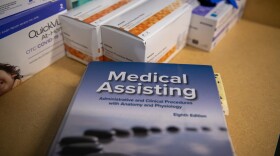The results of a new community health survey from the Centers for Disease Control and Prevention’s (CDC) Agency for Toxic Substances and Disease Registry (ATSDR) show that cross-border sewage pollution isn’t just closing beaches, it’s disrupting the daily lives of people who live, work, and go to school in San Diego’s South Bay. The survey was conducted in November 2024.
More than 2,000 people completed the online survey. The majority of participants — 64% — reported new or worsening physical symptoms in the last 30 days, including coughing and congestion they believe are tied to the ongoing sewage crisis, while 65% said it’s also affecting their mental health.
Dr. Sayone Thihalolipavan is the county’s new public health officer. He says the findings should change how doctors in the region approach patient care.
“Our health care community in South County needs to know that many of their residents are impacted by the Tijuana River, and they need to have a lower threshold when talking to their patients around, you know, looking for things like depression, anxiety, headaches, respiratory symptoms, things that came out from these findings,” he said.
He said while there is no contamination from the sewage pollution in the water supply people are still concerned about the drinking water.
“70% of individuals said that they are drinking bottled water instead of their tap water,” he said. “We know that the impacted communities, unfortunately, are less resourced financially. So we want to make sure that people aren't spending money on things that they don't need to spend money on.”
Residents in impacted communities are also being encouraged to take advantage of free air filters. And to check the County’s environmental dashboard that tracks beach water quality, odor complaints, and hydrogen sulfide levels.
The County said this is its only active local emergency. Officials said they are working with partners to expand outreach through community health workers and social media, educate the public about tap water safety, and promote mental health services, including the 988 suicide and crisis lifeline.
County officials said the survey results will help push for more coordinated state and federal action and long-overdue solutions.





